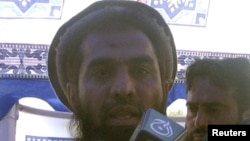A Pakistani court granted bail on Thursday to a man accused of masterminding a deadly 2008 rampage through the Indian city of Mumbai, lawyers said. The decision to grant bail to Zaki-ur-Rehman Lakhvi drew quick condemnation from India and is likely to hinder attempts to patch up relations between the nuclear-armed neighbors.
The court ruling came as Pakistan was struggling to come to terms with its biggest ever militant attack, the killing on Tuesday of 132 school children and nine members of staff in Peshawar city.
The Pakistani Taliban said it was revenge for a military offensive against them. India condemned the attack.
Lakhvi was arrested in Pakistan in 2009 in connection with the attack on Mumbai by Pakistani militants in which 166 people were killed.
The sole surviving gunman had identified him as the mastermind. Since then, he has been held in jail in the city of Rawalpindi.
"Yes, the court has issued Lakhvi's bail orders today, against a surety amount of one million rupees [$10,000], "defense lawyer Rizwan Abbasi told Reuters. "Hopefully, he will be out on Monday or Tuesday."
Prosecutors could challenge the ruling, one said.
"After reading through the detailed order, we will be in a position to decide if we are going to challenge the court's decision," said prosecutor Chaudhry Azhar.
India blamed Pakistan-based militant group Lashkar-e-Taiba for the Mumbai attack.
Ten gunmen spent three days spraying bullets and throwing grenades around city landmarks.
Indian investigators said Lakhvi was Lashkar-e-Taiba military chief. Indian Home Minister Rajnath Singh said his bail was deeply unfortunate.
He said Pakistani Prime Minister Nawaz Sharif had vowed to crush all militants after this week's school attack. "I hope the Pakistan government will appeal to the upper court so that Lakhvi's bail is canceled," he said.
Relations between India and Pakistan, who have fought three wars since independence in 1947, nosedived after the Mumbai attack and have not fully recovered.
A dispute over the Kashmir region periodically flares into violence. Sharif says reconciliation with India is a priority but this year, India elected Narendra Modi, a hawkish nationalist whose party is often accused of favoring India's majority Hindus at the expense of religious minorities.
Sharif vowed this week there would no longer be any distinction between "good" and "bad" Taliban, an attempt to draw a line under years of Pakistani support for militants it saw as useful in opposing India. Pakistan insists the policy is over, but many militant groups banned by the government still operate under new names.





